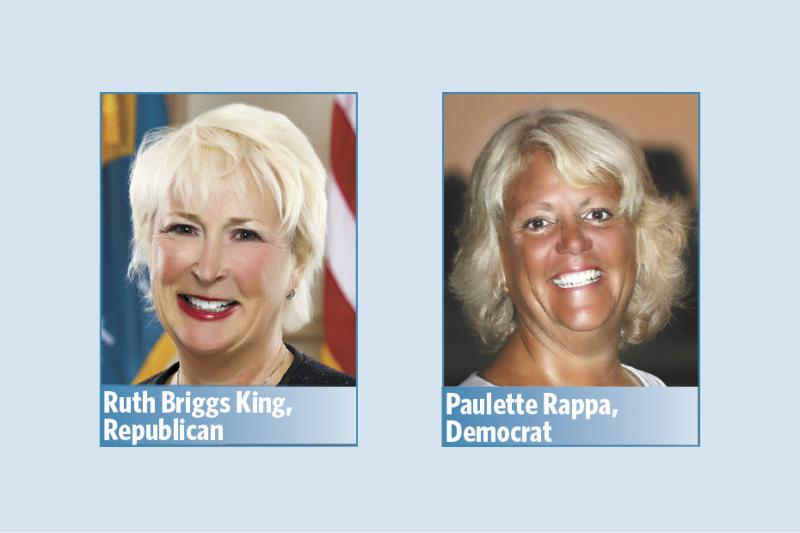The race for the 37th Representative District seat features the only race between two candidates who have run against each other before – Republican incumbent Ruth Briggs King and Democratic challenger Paulette Rappa. Briggs has represented the district since 2009. The candidates faced off in the 2014 election; Briggs won with 4,173 votes to Rappa’s 2,214. The district includes Georgetown, Long Neck and Oak Orchard.
• Ruth Briggs King •
Party: Republican
Age: 60
Education: Master of science in human resources, with emphasis on leadership and instruction
Occupation: Interim vice president of human relations for Nanticoke Health Services
Residence: Georgetown
Family: Husband, Stanley; two adult children and their families – Jared and Noelle, parents of Gabriella, Colin, and Ryan; Justin and Amber, parents of twins Alexis and Victoria.
Relevant experience: I have served in the state legislature since a special election in 2009. The original district spanned from Georgetown to Lewes but changed after the 2010 redistricting.
• Paulette Rappa •
Party: Democrat
Age: 54
Education: B.A., communication; certification to teach English, secondary education; M.S., educational psychology
Occupation: Educator
Residence: Long Neck
Family: Married 16 years; 8 children
• The district has a number of developments where manufactured homes are on leased land. What are the primary problems facing those residents, and what would you do to address them?
Ruth Briggs King – The potential for annual rent increases, the requirement to maintain the home to certain standards, and decreasing value of these homes creates unique challenges. Residents desire some stability and reasonable certainty related to rents. I was successful in passing rent justification to help stabilize rental increases on the Consumer Price Index. Additionally, we created a rental assistance program within the Delaware State Housing Authority to help those who qualify for assistance. We must be careful to balance the needs of the homeowners with the rights of the landowners. I plan to continue education and awareness events.
Paulette Rappa – I understand the relationship that a manufactured homeowner shares with a community owner because I have lived in manufactured housing and continue till this day to live on leased land. Manufactured homeowners cannot realize any equity out of their investment because their homes are still titled and not deeded. Deeding these homes would open up avenues of conventional financing, access to home equity borrowing and more competitive homeowners’ insurance. The Attorney General’s Office is tasked with handling manufactured homeowners’ complaints, but they are overwhelmed. I propose instituting an ombudsman position that will oversee the enforcement of regulations.
• Where are the district’s transportation priorities? Do you support a gas tax to fund improvements?
R.B.K. – There are a number of widening and turning-lane projects on Route 24 intersections in the planning stages where funding has been allocated. They include intersections with routes 5 and 23, Camp Arrowhead Road, Mount Joy Road, Oak Orchard Road, and Bay Farm Road. In Georgetown, a relocation of Park Avenue to help create shoulders and to signalize the South Bedford Street and Arrow Safety Road intersection. At the U.S. 113 and Route 404 intersection, replace existing signals and reconfigure in anticipation of the behavioral hospital. I do not support increasing the gas tax for funding improvements. I do support all of the gas tax revenue going toward transportation.
P.R. – Public transportation is limited to just the summer months and traffic has become more congested. Private companies have supplemented to meet the need for transportation, but more needs to be done. Introduced in Georgetown, DART’s Flex Service could work for Long Neck or Oak Orchard if a more stable public transportation line were established in the winter. Developing interconnected through ways between neighborhoods could also help the traffic congestion. A gas tax would not be my first choice to fund improvements. I would like to see the results of the pilot program to track driving as an alternate revenue source.
• What steps can be taken to reduce flooding in Oak Orchard?
R.B.K. – First, by taking the right steps to reduce flooding, we pinpointed problem areas and prioritized the work. We took action on projects we could fund and have seen improvements. We are working to complete a tax ditch. A funding stream was created that will dredge the Indian River, helping water outflow and reducing flooding. Residents can help by not throwing grass clippings, tree limbs and branches into ditches and by picking up trash so it keeps drains open and water flowing. We are battling Mother Nature and the low-lying area; therefore, it will not be an easy or permanent solution.
P.R. – Flooding in Oak Orchard is historical, and does not seem to have one simple solution. However, the time has come to explore setting Oak Orchard up as a special district, a form of a local government addressing a specific need for a specific community. Special districts save money for their citizens by selling tax-exempt bonds, purchasing essential goods and services tax-free, and participating in state programs and initiatives. District board meetings are usually held near homes of district residents, making it more convenient for citizens to attend, which gives citizens a better understanding of the issues in their own backyards.




















































